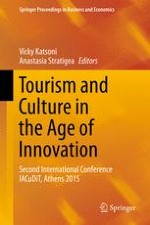
2016 | OriginalPaper | Buchkapitel
Interdisciplinary Integration of Heritage Studies and Sustainable Development
verfasst von : Vesselin Loulanski, Tolina Loulanski
Erschienen in: Tourism and Culture in the Age of Innovation
Aktivieren Sie unsere intelligente Suche, um passende Fachinhalte oder Patente zu finden.
Wählen Sie Textabschnitte aus um mit Künstlicher Intelligenz passenden Patente zu finden. powered by
Markieren Sie Textabschnitte, um KI-gestützt weitere passende Inhalte zu finden. powered by